




Confident Parents: Thriving Kids - Anxiety is a free program helping BC families overcome anxiety challenges in children ages 3–12. This web- and phone-based coaching service helps parents and caregivers learn effective skills and strategies for managing anxiety.
Learn more at

Publisher & Managing Editor
Andrea Vance editor@westcoastfamilies.com
Editor Bianca Bujan bianca@westcoastfamilies.com
Contributing Editor
Jodi Iverson jodi@westcoastfamilies.com
Art Director & Layout
Kristy Hill studio@westcoastfamilies.com
Administration Jennifer Bruyns admin@westcoastfamilies.com
Accounts Receivable & Payable finance@westcoastfamilies.com
Advertising sales@westcoastfamilies.com 604 249 2866
Contributors
Alyssa Bauman
Bianca Bujan
Ann Gibbon
Jen Murtagh
Andrea Vance
Amanda Watson
Elaine Yong
For distribution inquiries, please email publisher@westcoastfamilies.com
All contents copyrighted © Written permission from the publisher is required to reproduce, quote, reprint or copy any material from WestCoast Families
Mailing address: 1215-C56 St. Box 18057
Delta, BC V4L 2M4 T 604 249 2866 | F 604 676 2802




www.twitter.com/wcfmag
www.facebook.com/westcoastfamilies
www.pinterest.com/wcfmag
Instagram: @westcoastfamilies
After having three babies of my own, one thing that constantly surprised me was just how much the information that was shared with new parents was focused on pregnancy and childbirth. And while these are definitely important factors when planning for a new baby, there’s also so much to learn about what happens once the baby arrives. New moms need to understand the challenges that come with breastfeeding, how common postpartum depression can be, how to co-parent successfully, and what to expect when returning to work (for those parents who work outside of the home). New moms need all the support they can get, not just in the beginning, but throughout their parenting journey.
With this in mind, this year’s Annual Baby Guide 2020 is all about new moms. From how to get help with breastfeeding challenges once your baby is born (especially at a time when in-person classes aren’t an option), to searching for balance between work and family, we know the struggle is real, and we’re here to help you as you ease into parenthood. Plus, we’re sharing some healthy snack recipes for new parents, so you can satisfy your cravings and stay nourished while you’re on the go.
We hope you find your balance, however that may look for you, and we warmly welcome you to the world of parenting - from our family to yours.


Canadian company Diono introduces the 10 year car seat, with 4 ways to travel from birth to booster. This seat adapts as your child grows, with a custom fit up to 54kg, and allows for rear-facing up to 22kg or 4 years. The slim fit design means you can fit 3 across in most vehicles without compromising comfort or safety. The steel core shields and protects too. In 5 gorgeous colours to suit any interior, this is the only seat you’ll need.
SHOP NOW | $250-$330
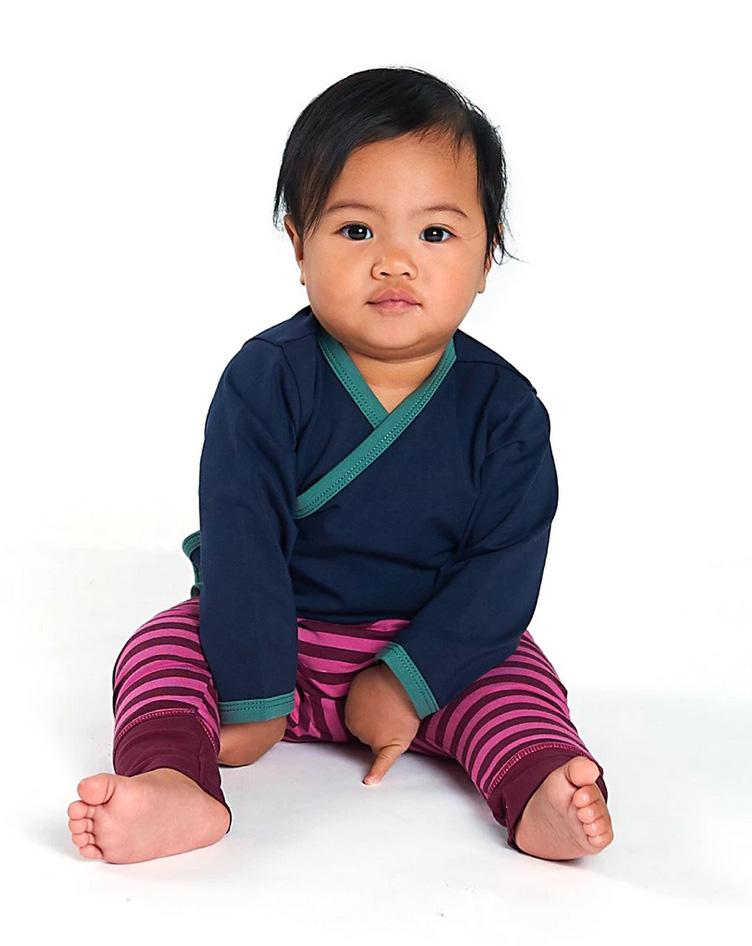



1

PK Beans (formerly Peekaboo Beans) is a local company that believes playful living makes happier humans. No buttons or fussy snaps, flat stitching, and easy dress necklines means simple, safe, comfortable baby dressing. This long-sleeved top with snap tape makes for easy, stylish dressing, layering, and changing.
SHOP NOW | $36
Made from non-toxic, durable soft foam, these shapes stick to tub walls when wet. For babies they make a great bath toy for gripping and seeing colours. As they head into toddler years, they’re perfect for learning colours, numbers and letters in a fun way. Spell names, count to ten, and sing along. Includes 36 floating letters (A-Z) and 10 floating numbers (0-9).
SHOP NOW | $12

As a parent, you want your kids to be confident and resilient with high selfesteem and ambition to achieve great things in life. The newly redesigned Resilience Kit is a collection of printable worksheets, posters, activities, and colouring pages designed to help children develop grit, resilience, and perseverance.The fun and engaging activities help your children cope, welcome mistakes as opportunities to grow, and overcome obstacles.
SHOP NOW | $18

5
4
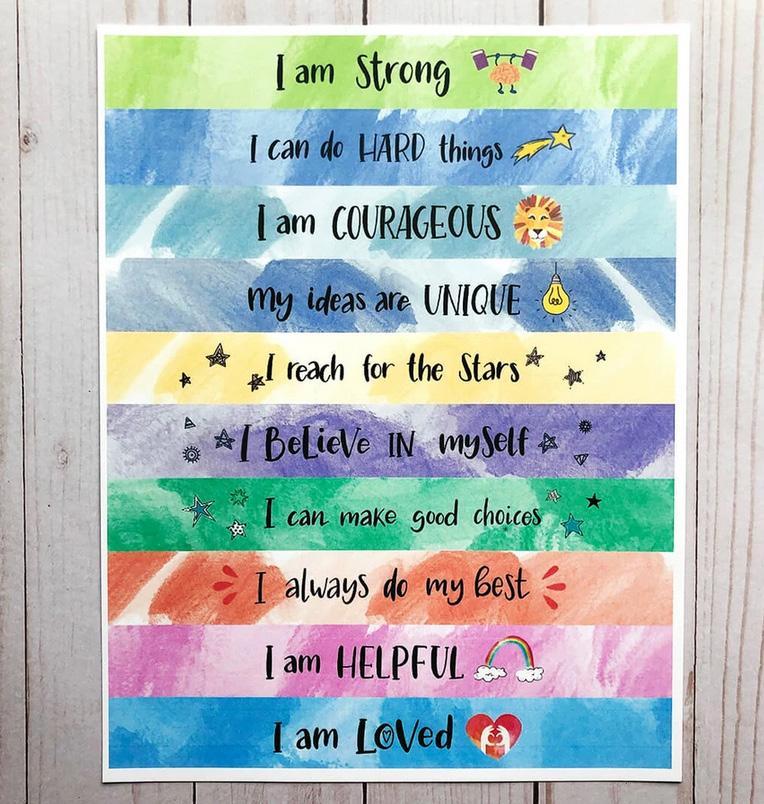
Use this folding portable crib as a stand-alone bassinet, a bedside sleeper, or as a travel-friendly crib. The adjustable design allows parents to adjust height to your bed, and the built-in wheels with brakes means it’s easy to move the crib around safely. The side sleeper means mom and dad can rest easy at night with easy feeding and a comforting touch.
SHOP NOW | $600
Misplaced or lost soothers? No more! From diaper bags to bottles, onesies to booties, this pack has a label for every one of your baby’s items and makes an ideal baby shower gift for a loved one. Durable dishwasher and laundry safe labels that will make going to and from daycare and playdates a little bit easier. Pack includes 54 waterproof labels and 2 tags designed specifically for baby clothes and gear.
SHOP NOW | $27
6
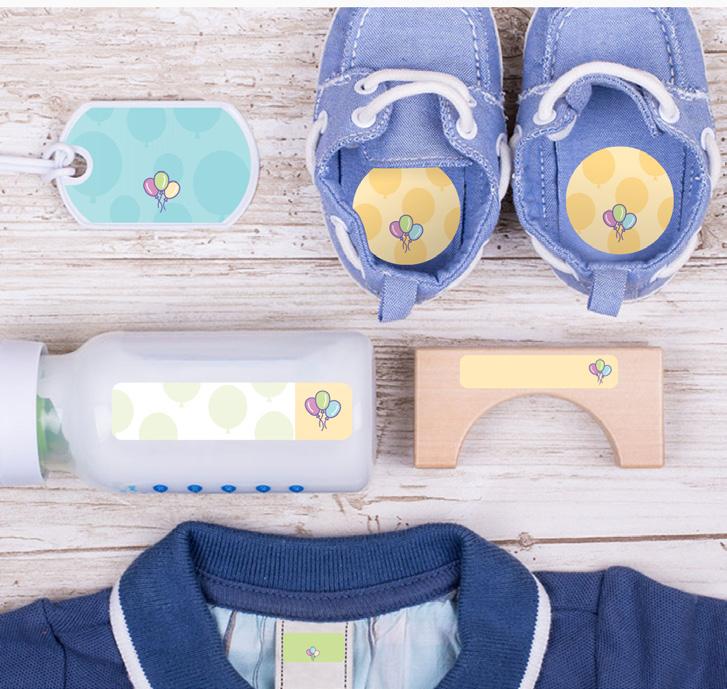

by Jen Murtagh
When my first daughter was born I didn’t know what I was doing. Although I went to prenatal classes and signed myself up for all the baby emails, neither of those did much to prepare me for the day-to-day life of motherhood.
I didn’t realize it at the time, I was becoming a “maternal gatekeeper”. began my new role with good intentions about how I was going to involve my daughter’s father in the raising of our little girl. As a feminist, I wanted to challenge gender norms in the home. I had read and understood how important it was for men to be very involved in the caregiving, both for the benefit of the child and for the relationship between partners. I also recognized that if I wanted to continue to grow my career, I was going to have to figure out a way to release some of the domestic responsibilities, and let dad be a true equal partner.

I started pumping right away so he could give her a bottle, I asked him to change her diapers and encouraged one-on-one time together. He really stepped up and developed a beautiful bond with her in the first few weeks. But then her colic started, and sleep deprivation kicked in and all of a sudden my good intentions seemed to unconsciously go out the window. I noticed myself becoming increasingly critical of how he dressed her, that he didn’t give her enough milk, that she didn’t want to be held “that way”. Although
For those unfamiliar with the term, maternal gatekeeping refers to when moms control dads' household responsibilities and/or interactions with their children. For example, my daughter had colic and I was convinced only I could soothe her. If her father was struggling to calm her down, I would intervene, demanding he “give her to me” and literally scoop her out of his arms.
Maternal gatekeeping is mostly done unconsciously but it can erode both a father’s feeling of competence and confidence in how to care for his children. It can show up in varying forms, such as giving your partner instructions on how to do things instead of letting them figure it out for themselves, critiquing how your partner is caregiving, and controlling the amount of time your partner has with the baby.
Research documented from over the last two decades will show a direct connection between how controlling the mother is of her partner’s parenting and how much parenting he actually does. So basically the more you do, the more your partner backs off.
It happened in our household, despite my very intention for it not to happen. I would leave instructions if I was going out with friends for dinner, which included what to feed the baby, when to feed the baby, when to put the baby to sleep, rather than just letting him develop the confidence himself to actually know what our daughter needed.
So what can be so bad about mom doing everything? Well, a lot in fact. Maternal gatekeeping can lead to growing conflicts between you and your partner. It can also contribute to burnout, overwhelm and anxiety when you feel like you are the only one that can do anything the “right way”.
The ironic thing is that the more I did and overfunctioned, the less my daughter’s father did
and then my resentment grew that I was doing everything. I blamed him for not helping enough, complained to friends, and yet in retrospect, I helped co-create that scenario. I realize that both my anxiety and perfectionism contributed to some of this and looking back I would have done things much differently had I been aware of what maternal gatekeeping was at the time.
Maternal gatekeeping is most common for first-time moms so thankfully I made some big adjustments by the time our second child arrived. My motto went from “make it all look good” to “done is better than perfect”. Instead of criticizing, I leaned into encouraging. Instead of leaving pages of notes for him when I was gone, I just left and yelled “good luck honey!” on my way out the door.
Maternal gatekeeping starts with mom. So if you find yourself feeling like you are doing everything, you may extend yourself compassion and ask “what can I release here?” In coming to a deeper understanding of self, releasing my perfectionist tendencies and leaning into vulnerability, I was able to transform both myself and the way I mothered.
Jen Murtagh coaches female leaders to live + lead bravely so they can create meaningful impact and design a life they love (without burning out in the process). Find her on social @jenmurtaghcoaching and at jenmurtagh.com
by Ann Gibbon & Elaine Yong

When you’ve just had a baby, the fatigue and anxiety surrounding breastfeeding are heightened at the best of times. When there’s a pandemic, that’s taken to a whole new level.
To ensure women continue to receive breastfeeding support despite COVID-19, St. Paul’s Hospital has developed a virtual breastfeeding workshop for prenatal women. It was developed to give them the skills and confidence to feed their hungry newborns before the wearying postpartum days ahead.
The sessions are designed to support the more than twothirds of moms who struggle with nursing their newborns. Andrea Firmani, clinical nurse educator at St. Paul’s maternity unit (and former labour and delivery nurse there), says while health experts continue to encourage moms to breastfeed exclusively up to six months of age, prenatal education spends very little time on this. She’d like to see expectant moms set themselves up for success before any problems arise, rather than what most women do now – seek help after they have a problem.
For that reason, the virtual breastfeeding sessions complement the virtual prenatal curriculum. “We spend a long time talking about how to deal with contractions in prenatal classes. But if we add up the time we are actually going to be dealing with contractions versus feeding your baby, we should be focusing a lot more time on breastfeeding,” she says.
Firmani has personal experience around breastfeeding difficulties. The mother of three couldn’t get the hang of it when her third child was born five years ago. “I thought, ‘Who can I ask because I’m the person people ask!’ I just wanted someone to tell me what to do,” Firmani recalls. So she herself contacted one of the St. Paul’s lactation consultants and got the guidance she needed.
The classes prepare expectant women for what lies ahead to help normalize the ups and downs. One example is ‘night two.’ Firmani describes it as intense cluster feeding (a lot of short feeds over a few hours). It can be shocking for a first-time parent, but she emphasizes, “This is expected. It is biologically normal. It’s not going to be forever. We just have to move through it.”
There are two types of the breastfeeding sessions offered via Zoom. Expectant moms can sign up for two-hour private sessions with a nurse (Firmani is one of them) who specializes in lactation and breastfeeding. Or they can participate in group classes of up to three people.
Women across the country can sign up for either option. There is a nominal fee to cover costs (and it is less expensive for the groups), but Firmani says no woman will be denied access due to an inability to pay. For more information on prenatal virtual support at St. Paul’s, please visit: prenatal virtual workshops.
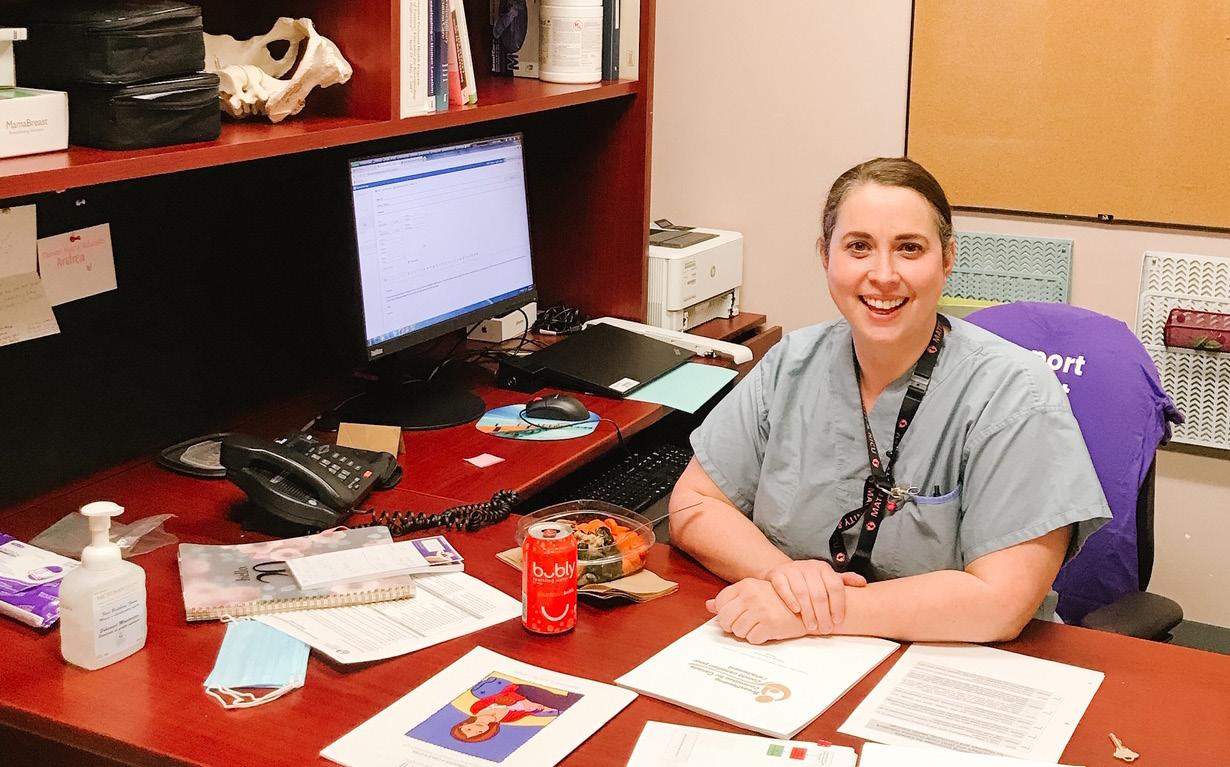
S H O P B A B Y

by Alyssa Bauman, Nourished.ca
These meatballs are loaded with protein and vegetables, and the bite size pieces make for easy healthy snacks on the go, as you can eat them with just one hand. Quinoa doubles your protein intake without eating too much meat. Double the recipe and freeze for easy dinners or snacks to take with you.
INGREDIENTS:
1 lb organic ground turkey
1/4 cups cooked quinoa
2 cloves garlic minced
2 green onions minced
1/2 medium carrot grated and chopped finely
1 tsp grated ginger
DIRECTIONS:
1 tsp dried parsley
1 tsp dried cilantro
1 dash Chinese five spice
Couple dashes of soy sauce low
sodium
Juice of 1-2 limes
Salt and pepper to taste
Preheat oven to 350°F. Combine the turkey and quinoa in a large bowl. Don’t be afraid to get your hands dirty. Food always tastes better with some added love. Now add green onion, carrots, herbs, ginger, lime juice and salt and pepper. Stir everything together with your hands until you can easily roll them into little balls. Roll out your turkey mixture into whatever size meatballs you like - I make mine almost bite size for easy protein snacks. Place your meatballs on a baking sheet lined with parchment paper. Bake them for 10 – 20 minutes, depending on the size, until they are no longer pink in the middle.
New parents often put themselves on the back burner to take care of baby, even though we know how crucial it is to take care of ourselves too. These recipes should help in three ways: First, they are easy to make and store, so you can double the recipe to enjoy again later. Second, they are full of much-needed nutrition for energy, immunity, and health. Third, they are bite size and easy to eat or drink on the go, so you can take care of baby while you also take care of yourself.
Thanks to the use of amazing heart-healthy oats, this one is all good and gluten free too. This warm and gooey chocolate brownie is loaded with protein and antioxidants. Use high-quality chocolate chips and this could be the yummiest and healthiest sweet treat you’ll make this year.
INGREDIENTS:
1 1/2 cups cooked black beans (1 15 oz can drained and rinsed)
2 tbsp raw cacao powder
1/2 cups quick oats
2 leaves kale (washed and dried)
DIRECTIONS:
1/3 cups maple syrup
2 tbsp unrefined coconut oil
2 tbsp butter
2 tsp vanilla extract
1/2 – 2/3 cups chocolate chips
Preheat oven to 350°F. Combine all ingredients except chips in a good food processor or strong blender. Blend until smooth. A smooth texture is a must for best taste. Stir in the chips, then pour into a greased 8X8 pan (I grease with coconut oil). Optional: sprinkle extra chocolate chips over the top. Bake the black bean brownies for 15-18 minutes, then let cool at least 10 minutes before trying to cut. Makes 9-12 brownies.


This deceptively healthy smoothie is loaded with iron, magnesium, potassium, protein, omega 3s, fiber, and calcium. This makes a perfect afternoon pick me up or a nourishing breakfast treat — and you can drink it with one hand! The coconut oil will keep you satiated for hours.
INGREDIENTS:
1 banana frozen
3 tbsp cacao powder
1 tsp maca (not recommended for kids)
3 dates soaked
1 tbsp hemp seeds
DIRECTIONS:
Just blend, and devour!
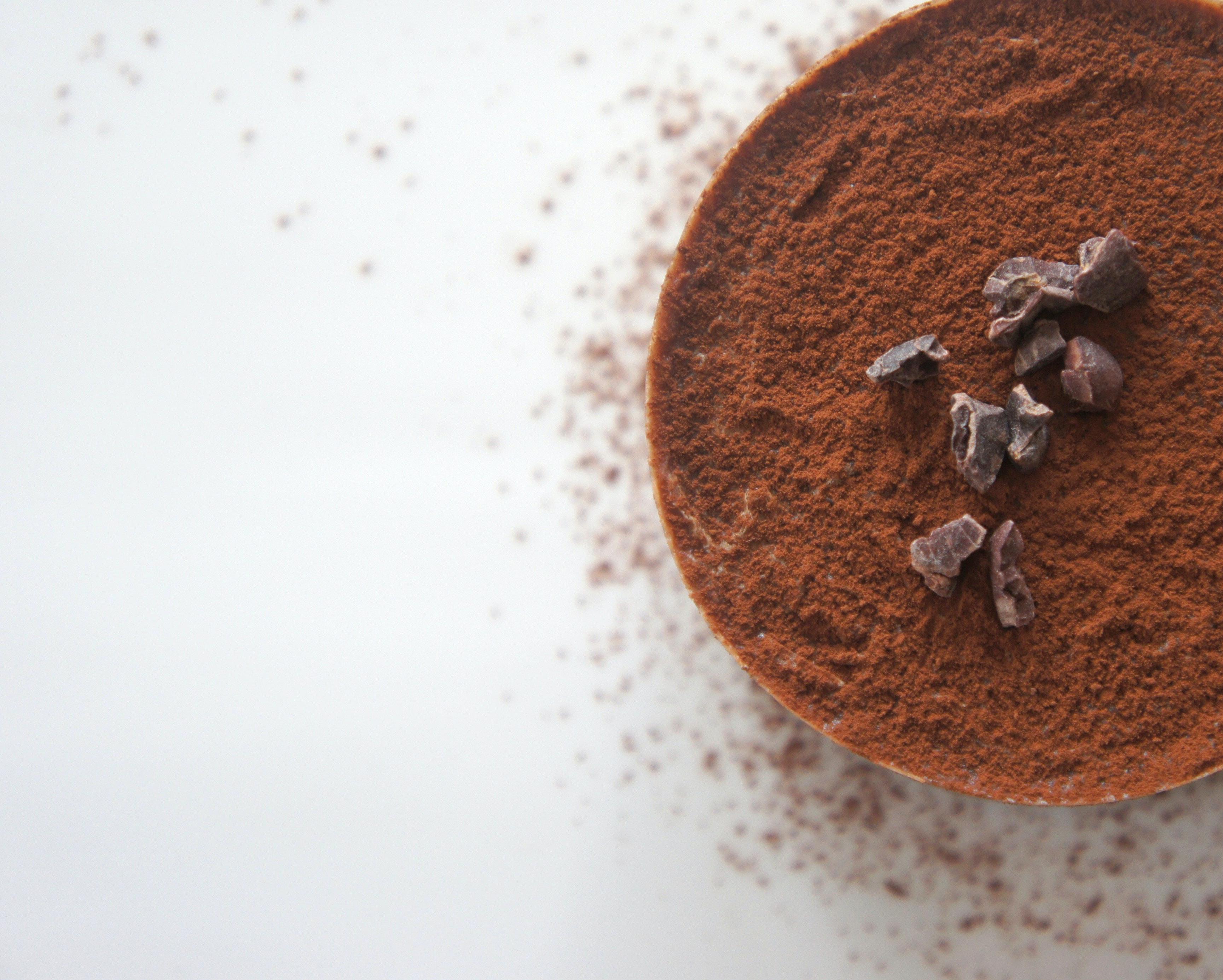
1 tbsp chia seeds
1 1/2 cups almond milk organic and unsweetened
1 tsp coconut oil
1 dash cinnamon 1/3 cups kale
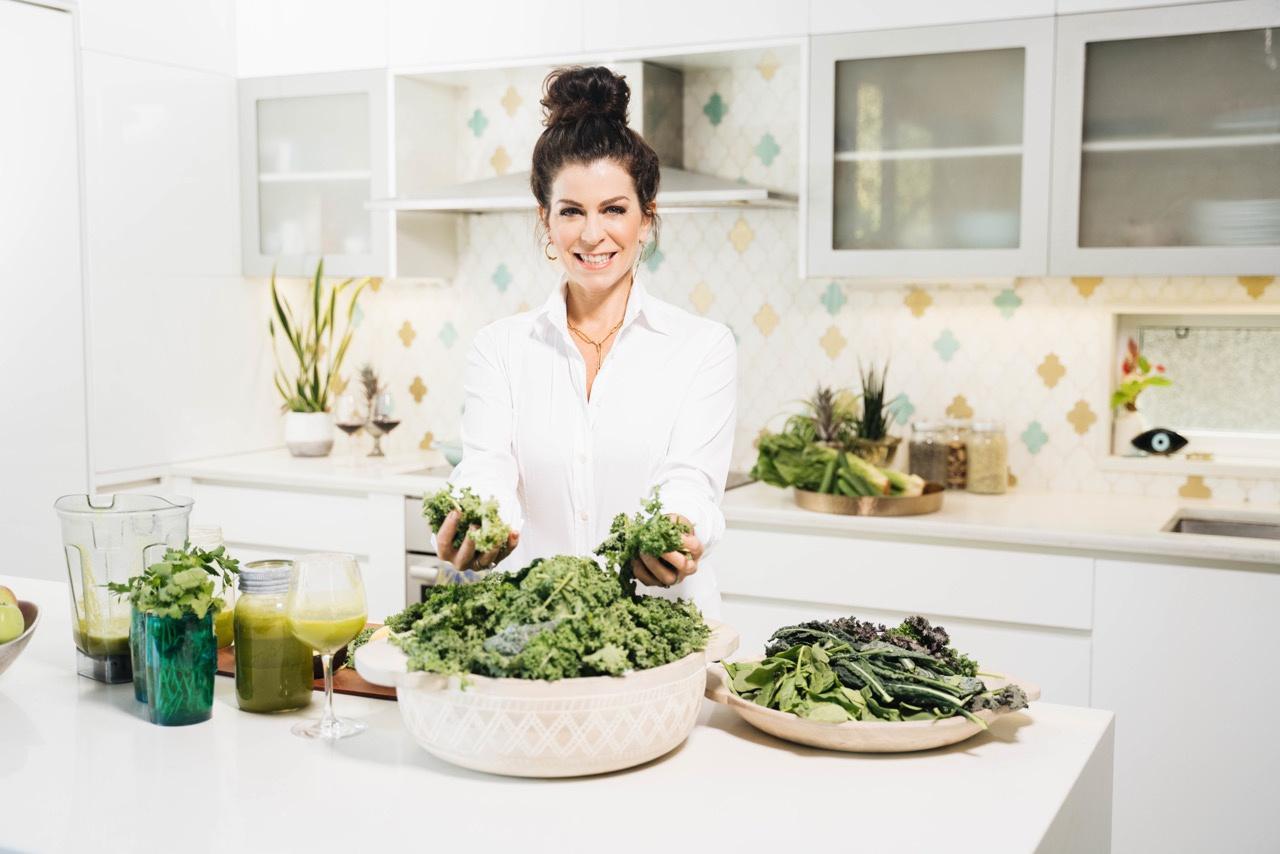


A to B is a nutrition methodology developed by certified holistic nutritionist, Alyssa Bauman Fascinated by how food effects the body, and the body’s marvelous ability to heal and care for itself when fueled properly, Alyssa is dedicated to helping people learn healthy nutrition habits that set them up for a lifetime of wellness
by Amanda Watson
When the COVID-19 pandemic struck our part of the world this past spring, I did what most working parents did (after panicking, crying a lot, checking my symptoms hourly, and stocking the pantry). I put my head down, rolled up my sleeves, and got to work.

I recall feeling incredibly appreciative that I didn’t lose my job. We were a lucky, dual-income household, in a privileged social position with respect to both race and income. We were tasked with staying put while people around us lost their jobs, risked getting sick on the frontlines of the crisis, and were forced to process egregious displays of anti-Black and antiIndigenous racism against families and communities.
While I put my kids in front of screens from April to July so that I could keep working remotely, I was putting the finishing touches on my book about the work and family pressures that are disproportionately expected of mothers during these anxious times. That book was released this September. The Juggling Mother: Coming Undone in the Age of Anxiety greeted the world in the height of back-to-school pandemonium in BC and in the middle of an unprecedented opioid crisis and the COVID-19 pandemic. The age of anxiety I was referring to has intensified beyond what we could have imagined even a year ago.
It has been incredible to connect with people over the themes I cover in my book, particularly in light of the disconnection that has characterized so much of this year. And what I might have called “juggling” in February might better be referred to as hanging by a thread ever since. Now that the book has hit delivery vans, I’ve been fielding two main questions above all others: how has COVID-19 made things worse for the juggling mother—the mother who scrambles to keep her multiple obligations together until she meets her emotional brink? And what are we supposed to do about this?
The first question is easily answered. Women juggling an unfair share of the load is a decades-old problem. We have known about it—intimately!—for a long time. But the unpaid, devalued, often-invisible work that falls on the shoulders of women more than it does on the shoulders of men is now laid bare for all—employers, in-laws, health professionals trained in COVID-19 testing (so many moms in those line-ups), and partners—to see. The effects are undeniable.
The second question is more complicated. We can easily point to social policy to help alleviate the problem. Universal access to child care, parental leave, affordable housing, and basic income would entirely change the landscape for families of all shapes, but I am afraid we can’t stop there. What I noticed when writing The Juggling Mother is the startling irony that part of what drives the unsustainable juggling act is a set of expectations I have of myself.
There is no tips-and-tricks list for this one. How can we dream up a new reality for busy families and burnt-out caregivers? How can we let go of impossible ideals of worklife balance when we are conditioned in their pursuit? We simply can’t go back to where we were a year ago: with women picking up the slack indefinitely and no end in sight. Research is already showing that women are considering leaving the workforce in numbers that would alter their financial sustainability for life.
Thankfully, we already have models for the kind of solidarity work that will be required for us to unlearn the impossibly high expectations of the juggling mother. Women across generations have been quietly doing it. Through formal election campaigns, political scandals, and economic downturns, they have been dropping off prescriptions, picking up children, cooking for special occasions, defending
land, and drawing baths. They have been picking up the phone, inviting near-strangers over for tea, and advocating for people who need assistance advocating for themselves in our schools and hospitals.
This is the work that is needed now more than ever. It’s care work. It’s simple, yet it is too often seen as the clutter that gets in the way of our other goals. When I look around me and see my colleagues, friends, and relatives utterly coming undone with their impossible to-do lists, I am optimistic that this work can be seen as work. It can be redistributed across family members and we would all be better for it.
Research is already showing that women are considering leaving the workforce in numbers that would alter their financial sustainability for life.
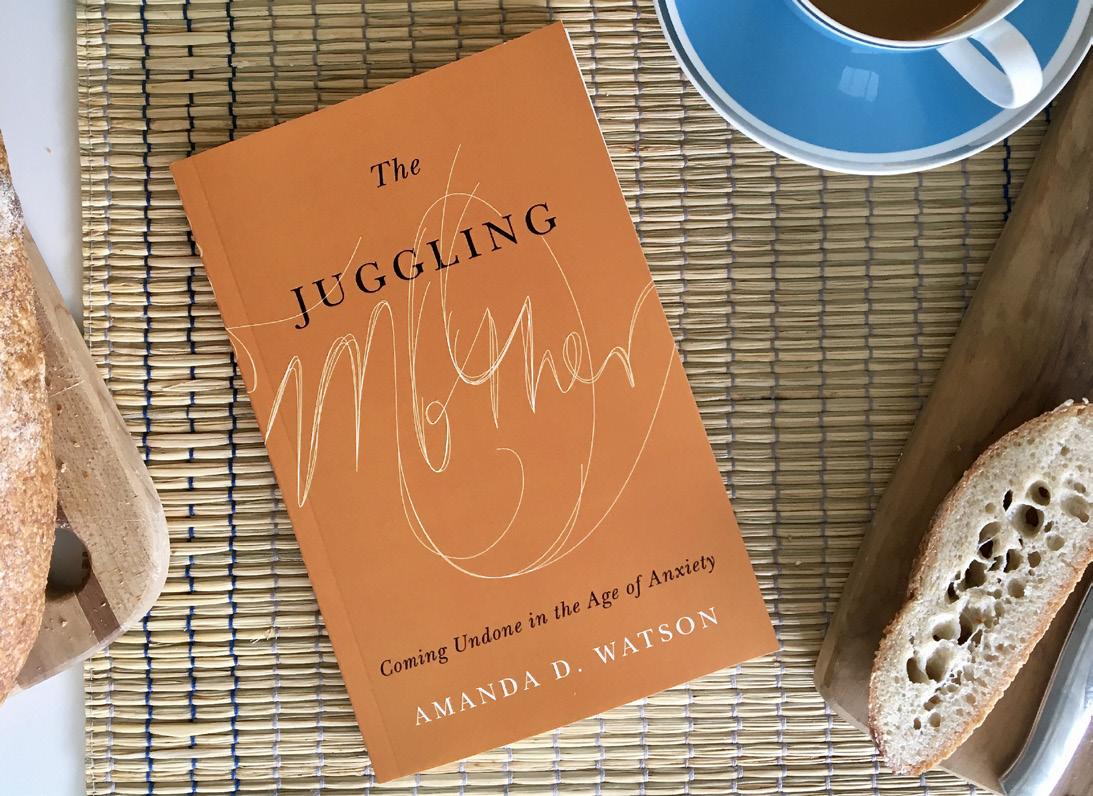
The Juggling Mother: Coming Undone in the Age of Anxiety was written by Amanda Watson, author, lecturer, and parent in Vancouver. Copyright © 2020 Amanda Watson. Reprinted with the permission of UBC Press. You can find The Juggling Mother at ubcpress.ca or by asking at your local bookstore. You can find Amanda @spindrwatson or www.amandadwatson.com